Author: admin
Action and Procession

Is there a point to bringing the bread and wine to the priest during the Mass? Why not just keep them near the altar and save someone the trouble? The Acts of the Apostles actually has quite a bit to say about this. The book presents us with the outpouring of the Holy Spirit in the Church, the Mystical Body of Christ. In the very first verse, Saint Luke says that his Gospel dealt with all that Jesus began to do and teach. But Jesus continues to act on earth through his Church, his Mystical Body. In Acts, the Church—the body of Apostles—performs the same actions that Christ performed on earth: preaching, praying, teaching, healing, forgiving sins, choosing apostles, and raising the dead.
Today, we do not commonly see the miraculous manifestations recorded in Acts, yet we see Christ continue his saving work in the acts of his faithful, from deeds of heroic charity to simple offerings of bread and wine. He invites us to participate in his work of salvation, not because he needs our help, but so that we may be perfected by entering into such work.
This grand drama is symbolically displayed in the offertory procession of the Mass. The General Instruction of the Roman Missal states that “it is a praiseworthy practice for the bread and wine to be presented by the faithful” (GIRM 73). As the words of the Mass remind us, bread and wine are “the work of human hands,” and so the faithful bring up their labors to the priest who is acting in the person of Christ the Head. One may object that the person bringing up the gifts did not actually make the bread or the wine. But as Saint Paul reminds us, “What do you have that you did not receive?” (1 Cor. 4:7). Everything that we have, we have from God. Any meritorious act we perform comes from the grace of Christ, received through his Church.
The offertory procession illustrates that Christ is both the origin and end of all that we do and offer to God. But there is an even deeper mystery here. The Mass transforms the offertory from a symbolic ritual gesture into an immersion into the very life of the Trinity. The bringing of the gifts has the practical end of providing the priest with the matter for the Sacrifice of the Mass. Here, we see that our participation in the Mass is a participation in Christ’s sacrifice on the cross to God the Father. And we are able to participate in the love between the Father and the Son by the gift of the Holy Spirit, who has filled us with the grace to be at Mass and participate in the offertory. In a simple and brief procession, we are caught up in the interior life of the Trinity. Stepping back, we see that the offertory procession reveals God as the source of all we are and all we do, God as the means of all we are and all we do, and God as the ultimate end of all we are and all we do. And all this, not because he needs us, but because he loves us. May we be reminded of this in our work and sacrifices throughout the week, which we offer to God at the Mass.
✠
Photo by Fr. Lawrence Lew, O.P. (used with permission)
Originally posted on Dominicana Journal
2023 St. Dominic Medal Recipient: Msgr. Andrew Baker
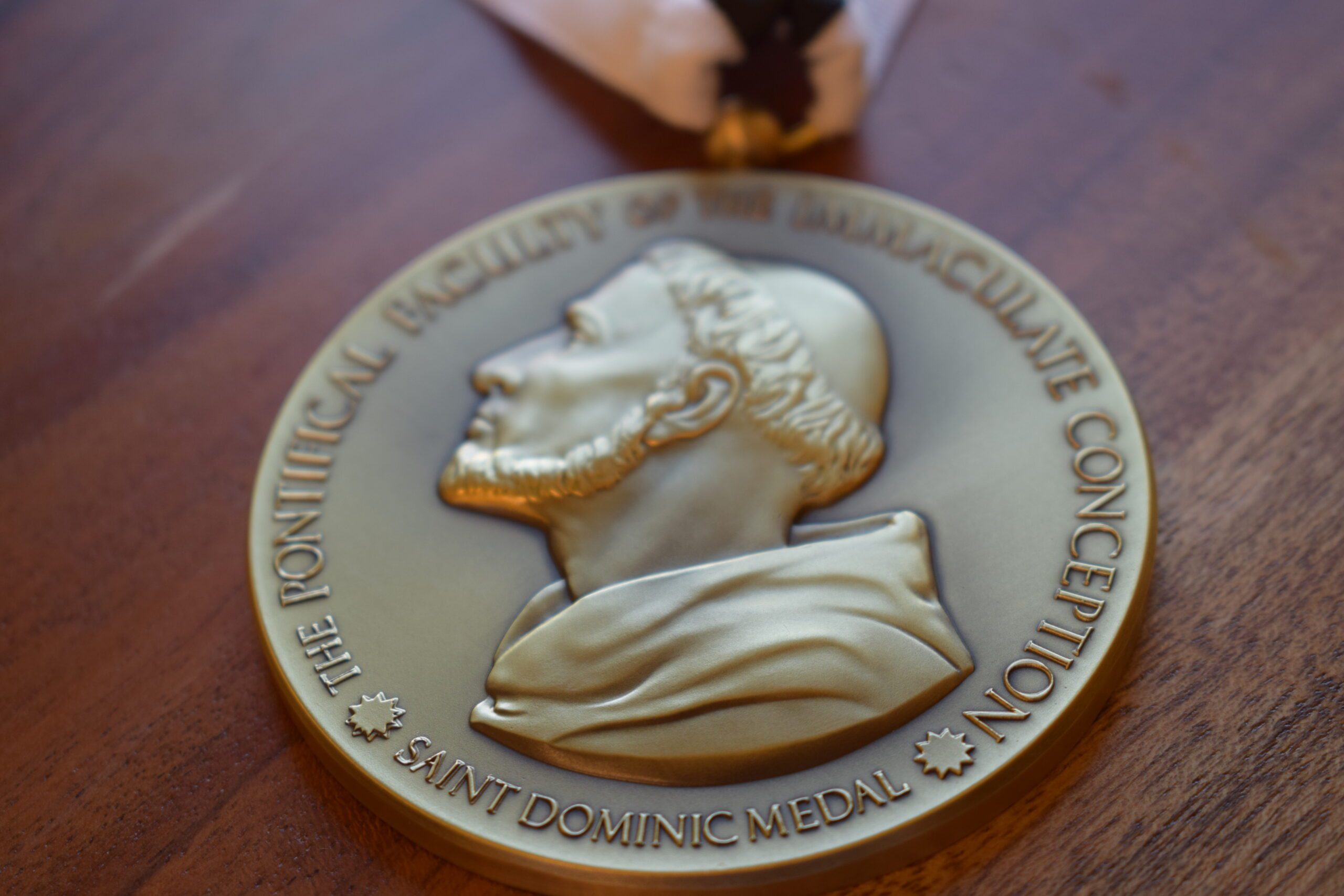
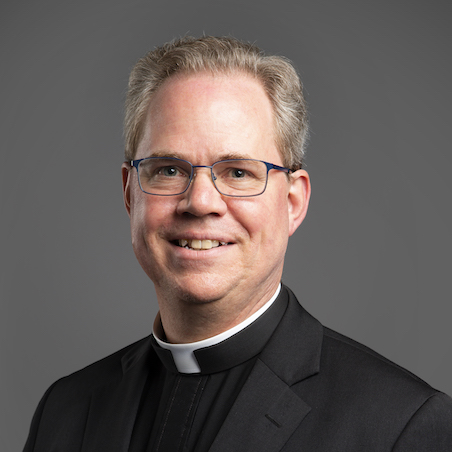
We are pleased to announce that Msgr. Andrew Baker S.T.D., Rector of Mount Saint Mary’s Seminary in Emmitsburg, MD, will receive the Saint Dominic Medal at this year’s Commencement ceremony. This honor is awarded to those individuals who, through demonstrated competency in their life’s work, have advanced the ideals of the Pontifical Faculty of the Immaculate Conception, thus promoting and bringing recognition to the charism of the Dominican Order. During Msgr. Baker’s tenure as rector has embodied the Pontifical Faculty’s commitments to truth and holy excellence by implementing innovative and effective programs to cultivate the formation of priests.
Msgr. Baker will give the commencement speech at this year’s ceremony on Friday, May 12 where both civil and ecclesiastical degrees will be conferred on the graduating students of the Pontifical Faculty of Immaculate Conception.
Due to limited capacity, attendance at the Commencement is by invitation only. Please pray for Msgr. Baker and the graduates of the Pontifical Faculty for God’s blessing in their work of proclaiming the clarity of Christ to a confused world.
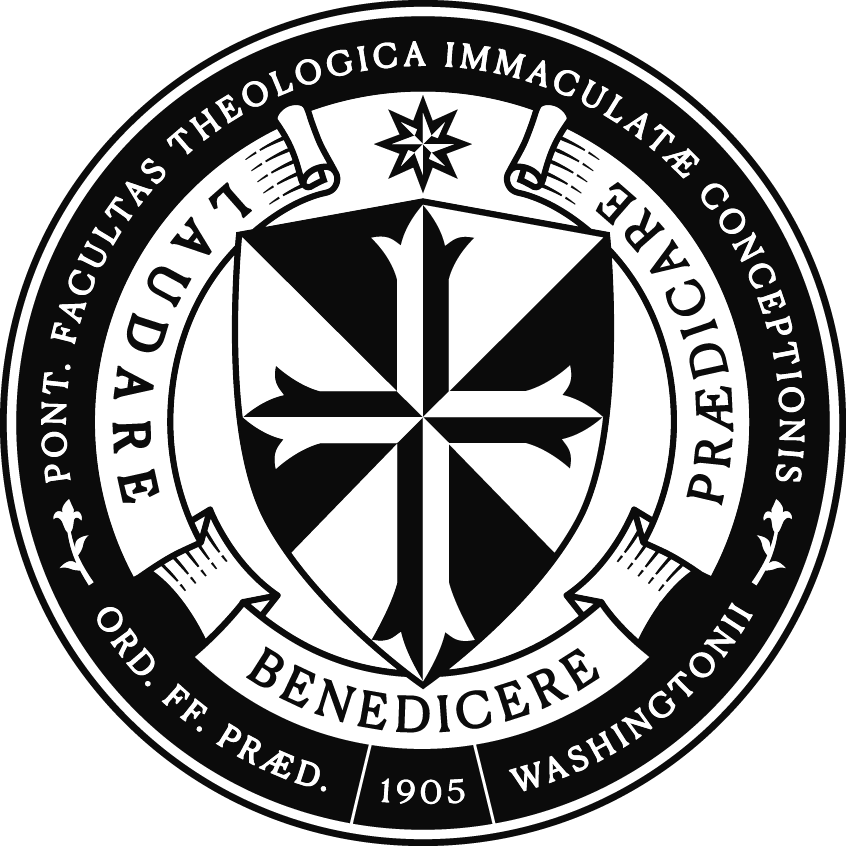
Lenten Joy
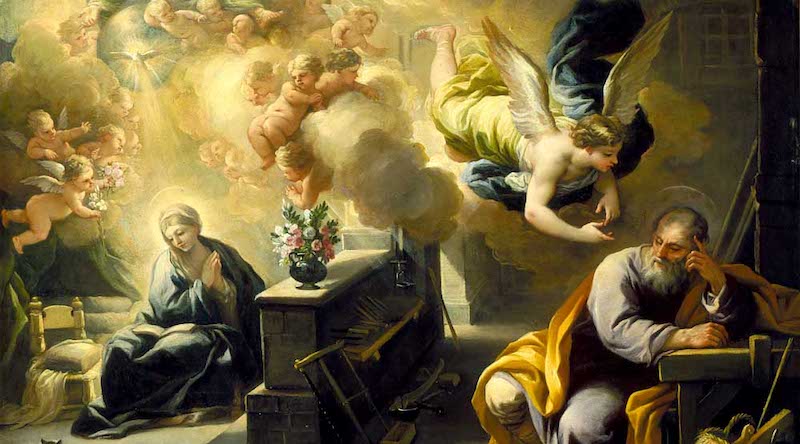
We find ourselves this Lenten week surrounded by a trifecta of celebratory days—this is odd. Shouldn’t we be dour? Shouldn’t we be occupied with doing penance and mourning for our sins? Were not those ashes to set us on a path of dismal gloom until the great Easter Proclamation brings it to a happy end?
To answer these questions, let us use Our Lady’s words as our guide: “My spirit rejoices in God my Savior” (Lk 1:47).
These words are repeated each day in the Magnificat of the Divine Office, and follow shortly after the Gospel selection for this Saturday’s Solemnity of the Annunciation. Within this text is contained that notion celebrated in Laetare Sunday, St. Joseph’s feast day, and the Annunciation: rejoicing.
To rejoice in God is to rejoice in his glory, manifested in all of creation. God’s work of grace in each one of us most especially manifests this glory (ST I-II, q. 113, a. 9, ad 2). To celebrate Laetare Sunday then, is to rejoice in God’s grace which purifies our souls through Lenten prayer, fasting, and almsgiving in preparation for Easter.
The Solemnity of Saint Joseph observed on Monday gives us the opportunity to celebrate the example of the silent foster father of the Christ child. Saint Joseph sought not his own will, but the will of God—how else could he have accepted such a strange message from the angel in his dream? He leaves us this example: finding our fulfillment in God’s will regardless of how overwhelmed, fearful, or unworthy we might feel to take it up. Saint Joseph shows that rejoicing need not consist in external jubilation, but is also fittingly expressed in silent and fortitudinous acceptance of God’s providence.
Saint Joseph’s acceptance of God’s will is beautifully complimented and fulfilled by the Solemnity of the Annunciation this Saturday, celebrating that crucial event from the first chapter of Luke. When troubled by God’s providential plan for our lives, we join Mary in her awe and questioning—“how can this be?”—and we find the same consolation in Gabriel’s reply: “nothing will be impossible with God.” Mary’s example of “may it be done unto me according to your word” becomes our prayer of rejoicing in the face of what seems to be a burden too heavy to bear.
The execution of God’s will is not without its trials, but as Saint Peter reminds us “there is cause for rejoicing here” even in our suffering (1 Pet 1:6-7). Lent dares us to add “especially in these trials.” When the going gets tough, and God has given us what seems to be too much to handle, we rejoice in the grace that he gives us to carry it out. Lent and its penitential practices allow us to come to terms with our own brokenness and unworthiness, reminded by the ashes of Ash Wednesday that we are dust, mere mortals. Yet in all this, God has made himself known, that we may carry out his will in our lives.
✠
Image: Luca Giordano, The Dream of St. Joseph
Originally posted on Dominicana Journal
God’s Suffering Shepherds

It does not take a genius to figure out that God has a thing for shepherds. From Abel to Jacob, Moses to David, and Amos to the shepherds of Bethlehem, the Lord has seen fit to select those who tend flocks as recipients of his favor. Often, these men of the fold were selected for special missions of drawing the people into a closer relationship with God, guiding them through the gate to divine pastures. This trend of divinely chosen pastors continued after the ascension of the Good Shepherd through his appointment of a chief shepherd (Jn 21:15-19) and further saintly shepherds in every age.
But a shepherd appointed by God is not cut from the same cloth as the romantic shepherd of Arcadia. Rather than lounging on sun-drenched hills, eating ripe grapes, and chasing fawns and nymphs, our shepherd endures scorching heat by day and frost by night as sleep flees from his eyes (Gen 31:40). He endures trials in guarding his charges and he himself draws closer to God through his suffering, being conformed to the Good Shepherd by taking up the yoke of the cross and finding his rest therein. Saint Patrick, the Shepherd of Ireland, was likewise conformed to the image of the Good Shepherd through his suffering and labor.
Though his father was a deacon and his grandfather a priest (at the time, married men could be ordained), Patrick, by his own admission, did not have faith as a young man. At sixteen, he was dragged away from his village in Britain by Irish raiders with other captives to endure punishment. He later acknowledged that they deserved such a fate “because we had gone away from God, and did not keep his commandments” (Confession of St. Patrick, 1). Enduring the bitter slavery of pagan Ireland as a swineherd, Patrick did not wallow in the depths to which he had sunk. Praying to the Lord became his consolation and he drew close to God while among the herds, in the woods, and on the mountains. Through his debasement and hardship his eyes were opened to God’s care for him even then and he returned to the Father he had turned his back upon (Confession, 2; cf Lk 15:15-20).
Even after escaping slavery, Patrick was not freed from trials and suffering. Called to the priesthood, he endured the trials of a stunted education, opposition by superiors towards his mission, and the calumnious accusation of a trusted friend. But, recognizing that he was like a stone that God had pulled from deep mud and placed upon a high wall, he endured all things to “shout aloud in return to the Lord for such great good deeds of his, here and now and forever, which the human mind cannot measure” (Confession, 12). Led by the Spirit, he returned to Ireland, the land of his captivity, no longer a lowly swineherd but a true shepherd according to the model of Christ.
The life of St. Patrick was a journey along the via crucis, from ignorance and ignominy to victory in Christ. This Way of the Cross became the model for the Irish people, who walked that road through poverty, calamity, persecution, and civil war. Following the way of St. Patrick, the Irish became “the people of the Lord. . . called children of God” (Confession, 36). Beyond simple asceticism, the Irish perfected the art of clinging to the Cross in imitation of the Lord. Not long after the death of St. Patrick, vocations began to flow from that tiny island as new shepherds were called from a people conformed to the crucified Christ. Many around the world have St. Patrick and his Irish shepherds to thank for their faith, and rightly celebrate that heritage today.
Here in the midst of Lent, let us learn from St. Patrick and take up our own crosses—especially those imposed upon us by circumstance—and follow the Good Shepherd. Let us draw near to Calvary, never shirking our burdens but always looking to Christ for aid. May we, through the intercession of St. Patrick, become true shepherds, faithful servants of the Lord.
✠
Image: Anton Mauve, Shepherd and Sheep
Originally posted on Dominicana Journal
Professor Jonathan Lunine
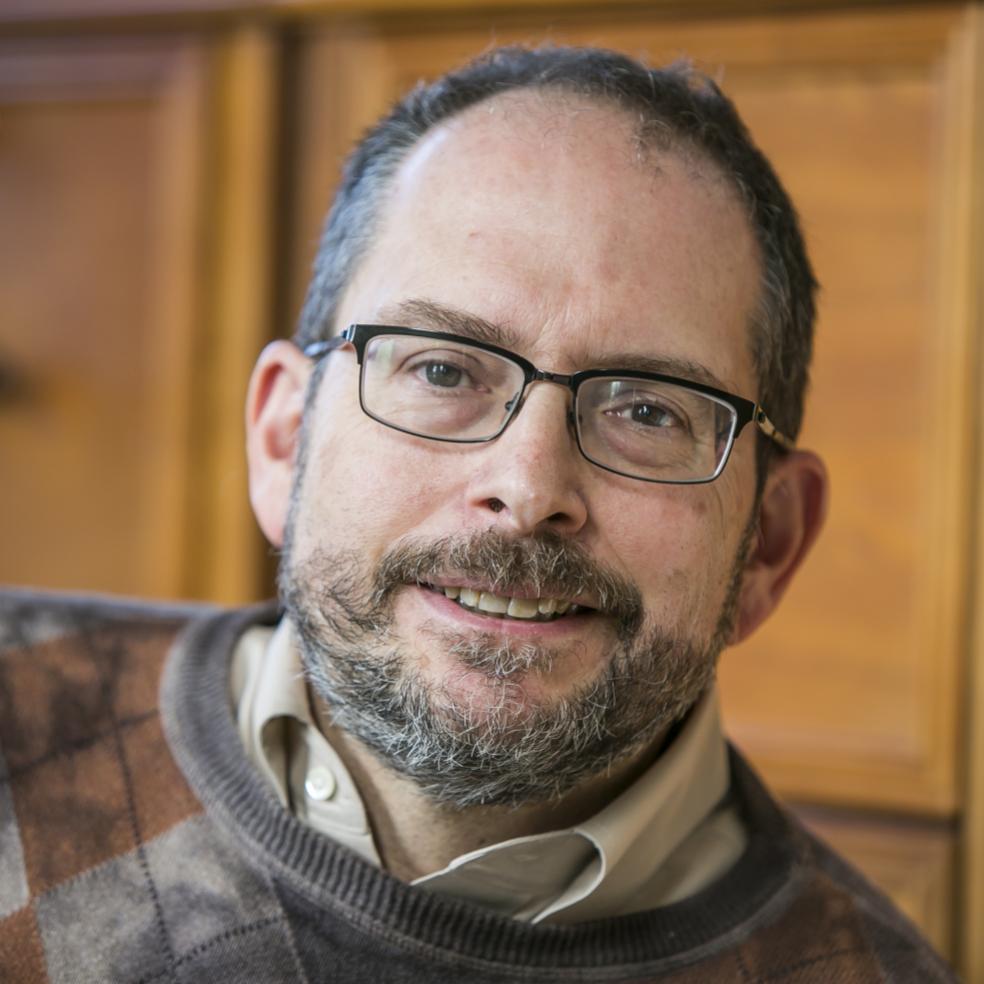
This semester, Prof. Jonathan Lunine, David C. Duncan Professor in the Physical Sciences at Cornell University, joined the faculty of the Pontifical Faculty at the Dominican House of Studies for a semester-long appointment as the McDonald Agape Visiting Scholar.
This partnership is made possible through a grant by the McDonald Agape Foundation, whose mission is encouraging Christian scholars and academic scholarship. The McDonald Agape Foundations grant, made to the Thomistic Institute, will support a visiting scholar at the Dominican House of Studies for one semester each academic year through the 2025-2026 academic year.
Lunine is Director of the Cornell Center for Astrophysics and Planetary Science and does research in astrophysics, planetary science, and astrobiology. He is a member of the U.S. National Academy of Sciences, and among other awards is the recipient of the Jean Dominique Cassini Medal of the European Geosciences Union (2015) and the Basic Sciences Award of the International Academy of Astronautics (2009).
The author of several books, Lunine is also co-investigator on the Juno mission now in orbit around Jupiter, using data from several instruments on the spacecraft, and on the MISE instrument for the Europa Clipper mission. He is on the science team for the James Webb Space Telescope, focusing on characterization of extrasolar planets and Kuiper Belt objects.
Lunine’s appointment at the Dominican House of Studies is for spring semester 2023. During his time in D.C., Lunine will co-teach a course titled “Knowing the Cosmos: Contemporary Astronomy, Theology, and Philosophy” with Fr. Dominic Legge, O.P., associate professor of systematic theology at the Dominican House of Studies and Director of the Thomistic Institute.
The course “will engage fundamental questions about the visible order God has created, both from the perspective of contemporary astronomy, and from that of theology and philosophy, especially as informed by the principles of the Thomistic tradition,” according to the course description.
Lunine will also help lead an intellectual retreat for Thomistic Institute students, undertake academic research, and participate in the academic and spiritual life of the Dominican House of Studies. He has previously collaborated with the Thomistic Institute as a speaker for Thomistic Institute conferences and other events and has filmed several episodes for the Aquinas 101: Science and Faith YouTube series.
The Thomistic Institute is an academic institute of the Pontifical Faculty at the Dominican House of Studies in Washington, D.C. It exists to promote Catholic truth in the contemporary world by strengthening the intellectual formation of Christians at universities, in the Church, and in the wider public square.
Photo by Jesse Winter
God at Rock Bottom

Bill Wilson, co-founder of Alcoholics Anonymous, wrote that “few people will sincerely try to practice the A.A. program unless they have hit bottom.” He found that utter desolation—rock bottom, as we call it—often incited alcoholics to admit their helplessness and surrender to a higher power.
So, then, is rock bottom a good or a bad thing? Without downplaying the awfulness of suffering and how horrific the lowest low may be, I propose that the very idiom hitting rock bottom indicates a hopeful reality.
Hitting rock bottom is not an experience known only to addicts, and it looks different from one situation to another. The cause could be the loss of a loved one, a severe illness, financial ruin, depression, or one of a hundred other calamities. In every case, however, the term rock bottom evokes the image of a dark and immensely deep hole in the ground. The afflicted person is at its floor; he is wounded, seemingly alone, and certainly unable to climb out on his own.
At the same time—and this is the hopeful part—the man at rock bottom is unable to go any further down. He has struck solid, immovable rock. The image is apt because when it seems like all the good things we hold dear have been dug out from beneath our feet (whether by ourselves or not), there is always at the bottom one foundational reality that cannot be disturbed or extracted: God, the very ground of our existence.
The Bible is replete with accounts of rock bottom, and the message is always the same: God is still God no matter what happens. Consider this passage from the Book of Habakkuk:
For though the fig tree blossom not
nor fruit be on the vines,
though the yield of the olive fail
and the terraces produce no nourishment,
though the flocks disappear from the fold
and there be no herd in the stalls,
yet will I rejoice in the Lord
and exult in my saving God (Hab 3:17-18).
You may lose your house, reputation, savings, good looks, hair, health, and even your loved ones, but you cannot lose God. Even if “the mountains fall into the depths of the sea” (Ps 46:2), you can take refuge in the eternal, unchanging Creator. While everything else does not have to exist, God simply is. He always has been and always will be; he made you and all the good things you may have lost. He is the reliable adamantine rock on which everything stands, and, in fact, he is the only support you need.
Some holy men and women endure a kind of spiritual rock bottom. Though in the state of grace and indeed very near to God, they feel utterly empty, especially when they try to pray. Like the Crucified Jesus, the Man of Sorrows, they may even cry, “My God, my God, why have you abandoned me?” (Mt 27:46), and yet they also know in their bones that God is at their side, holding them in being. Thus, someone like St. Therese of Lisieux could write in her autobiography, “Spiritual aridity was my daily bread and, deprived of all consolation, I was still the happiest of creatures.” The saints know that God is near even in the darkness.
Someone at rock bottom likely may say, “It cannot get any worse.” Interpreted in one way, this is a bleak declaration of despair; in another, it is a sound confession of faith: As awful as things are now, I know they cannot get worse because “neither death, nor life, nor angels, nor principalities, nor present things, nor future things, nor powers, nor height, nor depth, nor any other creature will be able to separate us from the love of God in Christ Jesus our Lord” (Rom 8:38-39).
With faith, rock bottom is a sign of hope. When we fall into the depths—when our lives are at their worst—we do not descend forever into a black hole of meaninglessness. Instead, we meet God, who loves us and upholds us.
I love you, Lord, my strength, my rock, my fortress, my savior. My God is the rock where I take refuge; my shield, my mighty help, my stronghold (Ps 18:2-3).
✠
John Macallan Swan, The Prodigal Son
Originally posted on Dominicana Journal
Everything Pertains to Love

The word “love” is cheap. Rather, it has been made cheap by a confused world that struggles to acknowledge the true desire of our hearts. In one moment, people declare love for their spouse or children, and in the very next moment express love for something like food, clothes, and the passing pleasures of this world. When everything seems to be worthy of love, love becomes less valuable.
While many have a confused sense of love, today the Church celebrates a great defender of true love: Saint Francis de Sales. Last December marked the 400th anniversary of his death, the day Pope Francis published an apostolic letter to commemorate the occasion.
Francis de Sales was a vastly influential figure in the history of Christian spirituality. His teaching can be summarized in his own words: “Everything pertains to love” (Treatise on the Love of God). He illustrates how everything in our lives involves love, for God is our everything, the same God who is love itself (1 John 4:7–21). He who numbered the vast sea of stars is also attentive to even the smallest hairs on our heads. What else could move the infinite God to care for such finite creatures except his infinite love? This God who has loved us so much, therefore, claims for himself the whole of our love: “You shall love the Lord your God with all your heart, and with all your soul, and with all your might” (Deut 6:5).
Francis de Sales’s emphasis on the love of God offers an invaluable lesson for a world that fails to understand it. Admittedly, there are some differences between him and the Dominicans concerning some theological topics. We don’t need to go into detail about these differences, but our shared zeal for the salvation of souls should lead us to defend this Doctor of the Church and his teaching on the love of God. After all, the love that Francis de Sales emphasizes is none other than a share in the very life of God, he who is our beginning and end, who moves and orders all things, the desire of our hearts and object of our study, the one whom we proclaim in our preaching.
We can even acknowledge similarities between Francis de Sales and another Doctor of the Church who resonates with the Dominican mind and heart: our brother Saint Thomas Aquinas. Touching upon Aquinas’s teaching on the created order, to say with Francis de Sales that “everything pertains to love” means that everything in our lives is an opportunity to see God’s loving and gentle presence around us and within us. Through a beautiful manifestation of God’s providential care in creation, the life of love enables men and women—created in his image and likeness, and made sharers in the divine nature by grace—to be that same gentle presence of God to the world.
Francis de Sales, like Thomas Aquinas, also has an optimistic view of the human person, encouraging people to live the life God has laid before them out of love for them. Growth in virtue requires a dedication to truth, including the truth of who we are before God and the world. Yet, we can still be transformed in this life by grace. Rather than being reduced to a wretch, the soul is elevated by nothing other than God’s love.
Despite our weakness and sin, God has sent his Son out of love for us. This speaks to the Christ-centered character of the writings of Thomas Aquinas and Francis de Sales. Christ brings us to the Father to share in divine love. He is our model and teacher in the life of sanctity, while also being the very cause of this new life through his death on the cross. As one hymn puts it: “Love to the loveless shown, that they might lovely be” (Samuel Crossman, “My Song is Love Unknown,” 1664). Christ’s love on the cross shows that we are both loveable and are in fact loved. God continues to manifest this truth through the sacraments and the gift that is his Church.
The Dominican soul proclaims, without compromise, that our life and beatitude begin and end with God, and he is at work in everything in-between. Saint Francis de Sales proclaims a similar truth by saying that everything pertains to love. For if God is love, then our life and beatitude begin and end with love, and love is at work in everything in-between.
✠
Photo by Fr. Lawrence Lew, O.P. (used with permission)
Originally posted on Dominicana Journal
Remedy For a Common Evil

Abortion remains the most contentious moral debate of our time, yet the logic against abortion is astonishingly simple. It is always wrong to kill an innocent human being. Abortion kills an innocent human being. Therefore, abortion is always wrong.
Justice demands that abortion be abolished. Jesus longs for justice, and so Christians have long opposed abortion to defend unborn life and to help those tempted to this injustice. As Christians, we must fight the evil of abortion and we must do so wisely. Proclaiming hard truths requires us to grasp why anyone would deny such truth. We can learn a great deal from the way abortion’s proponents discuss the act. When purportedly giving instruction about abortion, the first thing that several organizations supporting abortion mention is that “abortion is common.” They do not begin by disputing pro-life arguments, justifying abortion ethically, or even describing what abortion is. They simply affirm the fact that abortion is common. Why?
Abortion’s commonality garners support for the procedure. Since abortion is common, everyone knows women who have had abortions. Everyone knows men who have fathered children with utter disregard for the responsibility it brings. These women and men do not glow red or grow horns. So many people who have been involved in an abortion are funny and friendly and contribute to society in admirable ways. To say that abortion is gravely wrong is to say that all those involved in abortion—including many whom we like and respect—have contributed to grave evil. It is hard to believe that a friend could be at all involved in killing. Yet so many are. Murder can be as nonchalant as swallowing a pill or a few minutes with suction implements. As it turns out, murder is common.
This is a very heavy truth. It is a truth that indicts and implicates our society, not only in regard to abortion itself, but also in the circumstances surrounding it. If abortion is wrong, justice demands that we come to terms with the fact that so much of the developed world has legally permitted the killing of tens of millions of unborn babies since the 1970s. If abortion is wrong, justice demands that we reject our culture of casual sex and learn the often-mocked virtue of chastity. If abortion is wrong, justice demands that we learn to see that so many things that are common—including habits that may be deeply ingrained in us—are evil. These consequences are not easy to accept, so it is no wonder that so few accept them. Many well-intentioned people consider abortion as morally legitimate simply because recognizing the truth would make the world look bleak and friends and neighbors seem evil.
Yet just as emotions can make us deny that abortion is evil, they can also mistakenly lead us to conclude that evil actions make ourselves or others irredeemably evil. In truth, no one is completely corrupt. Everyone can change, and everyone can become righteous. All sins, including abortion, are forgivable. “God did not send his Son into the world to condemn the world, but that the world might be saved through him” (John 3:17). Jesus did not come because we were already good. He came to make us good. After the resurrection, our Savior gave the apostles the power to forgive sins sacramentally so that all who confess their sins could be restored to justice (John 20:19-23).
Confident in this truth, we can recognize that abortion, while common, is wicked. When face-to-face with those who have had or been involved in abortion, we know that that act does not define them and that God longs to show them his mercy. Recognizing the truth about abortion stings—not with the sting of a weapon but with that of a remedy. Like an antiseptic it kills the infection of falsehood. The truth alone heals our illness. The truth alone offers redemption and re-establishes justice.
✠
Image: Giuseppe Mazzolini, Watching the Baby
Originally posted on Dominicana Journal
Resquiescat in Pace: Pope Benedict XVI

On the morning of Thursday, January 5th, the Dominican community at the Dominican House of Studies had a Memorial Mass for Pope Benedict XVI. The President of the Pontifical Faculty, Father Thomas Petri, O.P., celebrated and preached the Mass. His brief homily is below.
Quotations are from Pope Benedict XVI’s first encyclical, Deus Caritas Est, and two book-length interviews with Peter Seewald: God and the World (published by Ignatius Press in 2002) and Last Testament (published by Bloomsbury in 2016).
Nobody who had followed the life, writings, and preaching of Joseph Ratzinger was surprised to learn last week that the last sentiment he articulated as he was fading from this world into the next was a simple profession of love for Jesus Christ.
His whole life was given over to that personal encounter with the Lord, which, he said, “gives life a new horizon and a decisive direction.” It had certainly done so for him. He knew Jesus to be the way to the Father—the way, the truth, and the life.
We can see throughout Pope Benedict’s life a desire to grow closer to Christ, pursuing an ever deeper encounter with him, but not only that. He sought to bring Christ—his teaching and his life—into greater clarity.
With a certain meekness, trusting in the truth of the Revealed Word, the authority of the Church, and the power of reason and faith to work together, Pope Benedict was always prepared to clarify, defend, and illuminate Christ and his teaching against any attempt to relativize the Lord, his saving message, his saving presence, to the whims of the world.
He once said that he thought that the task of his papacy was “to highlight the centrality of faith in God, and give people the courage to have faith, courage to live concretely in the world with faith.”
The emeritus pope didn’t expect his papacy to last long, and thought this was the task that he could accomplish. His papacy lasted eight years.
His resignation was remarkable for a whole host of reasons that have been rehearsed and will continue to be rehearsed for years to come. But more remarkable is how long Benedict lived as emeritus pope; it was longer than he had reigned as pope.
Though he remained hidden, we nonetheless had glimpses of him for the nearly ten years of his life in a monastery through interviews, letters, and photos. We saw a pope freed from the burden of office who was able to return to his heart’s desire: contemplating and encountering the Lord.
He had the experience I suspect most older people have who take religion seriously, who take their faith seriously. After he retreated to the Mater Ecclesiae monastery, he said that he had come to find “many statements from the Gospels more challenging in their greatness and gravity.” For him, Christ’s words had become more mysterious and awesome than before.
On the one hand, he noted, that in old age you’re more deeply practiced. “Life has taken its shape. The fundamental decisions have been made.” But on the other hand, you feel the difficulty of life’s big questions more deeply, and the weight of the problems in the world and in the Church more profoundly.
We should pray to the Lord to arrive at such a place in our old age.
Perhaps as a consolation, he said “one also feels the greatness of Jesus Christ’s words, which evade interpretation [as one gets older] more often than before.”
He always considered himself an average Christian. Someone who could always speak to Christ, who, nevertheless as a “lowly little man” did “not always reach all the way up to [the Lord].”
Pope Benedict always believed there would “be few people whose lives are pure and fulfilled in all respects.” But he hoped that there would also “be few people whose lives have become an irredeemable and total No.”
When asked in recent years about whether he feared death, he said this: “Despite all the confidence I have that the loving God cannot forsake me, the closer you come to his face, the more intensely you feel how much you have done wrong. In this respect, the burden of guilt always weighs on someone, but the basic trust is of course always there.”
He vowed that when he finally would stand before the Almighty, he would “plead with him to show leniency towards [his] wretchedness.” Surely, not for significant things, but for all the ways that he could have done better. All the omissions and deficient commissions.
That’s why the Church has a memorial Mass for him. Many memorial Masses.
Who can claim that at the moment of death he is absolutely ready to stand directly before God without shame and without sin? Certainly not Pope Benedict XVI.
He thought most people, faithful as they were, would find themselves in purgatory. Broken vessels that want to be put right.
“Purgatory,” he once said, “basically means that God can put the pieces back together again. That he can cleanse us in such a way that we are able to be with him and can stand there in the fullness of life…. When it comes down to it, we are all glad that God himself can still put right what we cannot.”
So we pray. We pray for this servant of the servants of God, Pope Benedict, that God put right in him everything that was wrong or broken. We pray his sins be forgiven.
That Father Benedict, as he once hoped to be known, be brought into the presence of God which he liked to think would be an “always new” encounter, “a perpetual, unending encounter, with new discoveries and new joy.” Forever.
Should he reach that place with Christ, as we confidently hope he will, we will then count on his prayers for the Church, which he loved as the bride of Christ, and which he served so well.
Praying for him now, we pray that one day, by the mercy of God, to benefit from his intercession. This is the Church’s final gift to him and her expectation in hope for him.
✠
The portrait used in the image above was drawn by Igor V. Babailov
Now That’s What I Call Advent
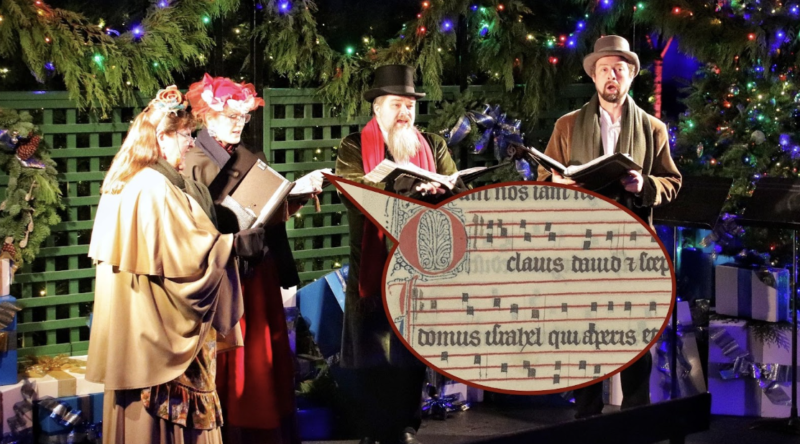
Do you hear what I hear? The streets outside permit no escape from this sound. Any refuge at home is invaded by a TV ad. Even the inner confines of your mind find no protection from that same string of notes playing over and over again. Of course, I speak of the four horsemen of Christmas: Bing Crosby, Burl Ives, Michael Bublé, and Mariah Carey.
Love it or hate it, Christmas music is perennially around. When we hear these songs (voluntarily or not), we get a sense of what the world thinks this season is about: Snow, Santa, Romance, Romance with Santa. There generally is nothing wrong with enjoying these songs (this author happens to be a big fan of Wham!’s “Last Christmas”). But occasionally something strange echoes from the Walmart loudspeakers: a song in Latin—about Jesus Christ! Gloria in Excelsis Deo! This “ghost of Christmas past” transcends the kitsch and reminds us of the true “chart toppers” of Christmas and Advent: the sacred music of the Church.
Enter the O Antiphons. These seven phrases, each calling upon a different name of the prophesied Messiah, solemnize Vespers (the Church’s evening prayer) each night in the week preceding Christmas. Appropriate for the season of Advent, these antiphons do not anticipate Christmas Day with chestnuts and Jack Frost, but with contemplation of him who is coming into the world: “O Emmanuel, our King and Giver of Law: come to save us, Lord our God!” Their ornate and haunting melodies and rich theological meaning make them a group of “classics” that cloistered religious look forward to every year. The O Antiphons’ yearly appearance makes them much like our favorite Christmas hits, but, unlike the sleighride songs, they have been popular for at least a millennium.
The question may arise: why celebrate Christ’s coming with such solemnity, if he has already come into the world? Religious life, the cradle of liturgical chant, can help us find an answer. Saint Thomas writes that the contemplative life “bestows on us a certain inchoate beatitude, which begins now and will be continued in the life to come” (ST II-II, q. 180, a. 4). Like an honored family tradition that brightens Christmas cheer each season, the O Antiphons beckon the religious to grow closer to the Lord. They help us to contemplate the king “who is and who was and who is to come” (Rev 1:8) and remind us to ask for the grace to be prepared to meet him face to face.
Not all of us wear a habit or are in the habit of praying Vespers in a choral setting. But every year, our most secular of cultures offers us a unique opportunity to contemplate the greatest of mysteries. As strange as it is to hear “Christ the Savior is born” as you try to find the best (or cheapest) candle at TJ Maxx for your nephew, it can turn into an example of God’s inescapable grace. Take to heart those words that faintly sound through the store, and ask for that grace to be prepared to meet him when he comes. Who knows, you may even hear the O Antiphons hidden away on that playlist.
O King of all nations and keystone of the Church: come and save man, whom you formed from the dust!
✠
Photo by Mario Mendez on Unsplash; Image: Antiphonaire dominicain, O Clavis
Originally posted on Dominicana Journal
